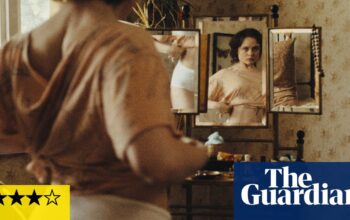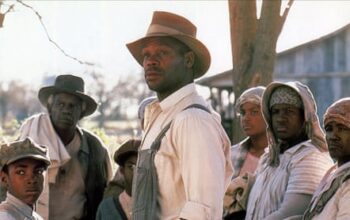In 1972, when Ana Torrent was six years old, a man came to her school and asked her to be in his film. “He had a beard,” she recalls now, from her home in Madrid. “And I told him I didn’t like men with beards.” The director said his film was about Frankenstein’s monster and asked if she was familiar with that character. “I replied, ‘I’ve heard about him but I haven’t yet been introduced.’ That’s when he thought, ‘She’s the one.’”
The director was Víctor Erice and the film was The Spirit of the Beehive. Made at the end of the Franco regime but set in 1940, in a Castilian village scarred by the recent Spanish civil war, it concerns two sisters whose imaginations are stimulated by seeing James Whale’s 1931 film Frankenstein at a travelling cinema. Torrent’s performance as the younger of the two girls – her face as pale and round as a communion wafer, her inky eyes watchful and wide – is among the most hypnotic ever given by a child.
Perhaps that’s because it isn’t a performance at all. “At that age,” she says, “I couldn’t separate fantasy from reality. That’s part of what the film is about.” Erice rechristened her character Ana when Torrent failed to respond to the fictional name in the script. And shooting was halted for two hours after she had an adverse reaction to the monster. “The actor was already in his makeup,” she recalls. “It’s no wonder I didn’t want to go near him.” What does she see now when she looks at herself in the film? “Complete truth. As kids, we have it naturally. As adults, we need to study to find it again.”
The Spirit of the Beehive transformed Torrent’s life. She went on to work with Carlos Saura and Alejandro Amenábar, starred in The Other Boleyn Girl with Natalie Portman and Scarlett Johansson, and is still acting today. The movie changed cinema, too. Sight and Sound magazine named it one of the 100 greatest films of all time; among those who voted for it were Aki Kaurismäki and Colm Bairéad, director of The Quiet Girl. Stanley Kubrick adored it and kept a print in his personal collection.
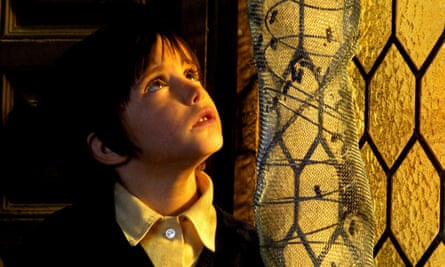
Guillermo del Toro, whose films Pan’s Labyrinth and The Devil’s Backbone are haunted by The Spirit of the Beehive, is a lifelong fan. “I am Ana,” he said in 2021, alluding to the unforgettable scene in which the girl says those words in an effort to summon the monster. “Like Ana,” Del Toro continued, “I believed at a very early age that if I closed my eyes and talked to the monsters, and said, ‘I am your friend,’ they would be available to me, unlike any of the Catholic saints that never materialised.”
Erice himself has proved only marginally less elusive. In the half-century since his debut he has directed just three other full-length features. One, El Sur, was released in 1983 in a form that Erice now calls “mutilated”. (The producer Elías Querejeta pulled the plug halfway through shooting, claiming the money had run out.) Erice’s contemplative 1992 semi-documentary The Quince Tree Sun showed the artist Antonio López García labouring at length over his canvas.
Thirty years on, most people had given up hoping for another feature from Erice. That includes Torrent, who had kept in regular contact with him. “I was shocked when he brought me a script two years ago,” she says. Torrent was touched, though, to find that her character in the new picture shared her name, and that she would be called upon to reprise the heart-stopping line she delivered at the age of six: “Soy Ana.”
The film, Close Your Eyes, tells the story of a director called Miguel, played by Manolo Solo, who hasn’t picked up a camera for two decades, after his historical epic The Farewell Gaze was abandoned following the unexplained disappearance of its lead actor. Cut to 2012 and the mystery is revived by a TV show called Unsolved Cases. Soon Miguel is on the trail of his former star, with Torrent playing the missing actor’s daughter.
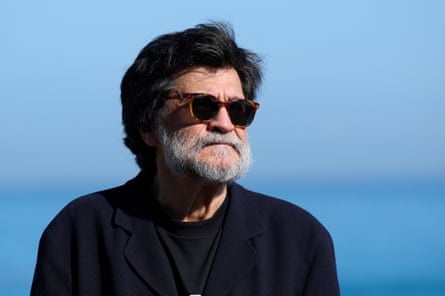
Torrent’s presence isn’t the only throwback to The Spirit of the Beehive. Both movies hinge on life-changing film screenings. And there are overlaps, too, with Erice’s career: Miguel’s unfinished project can’t help but recall El Sur. And since slipping from view, Miguel has also taken to writing film criticism, as Erice has done: his 1986 book about Nicholas Ray currently fetches around £300 online.
When I meet the director in a London hotel, he is wearing a dark suit and white shirt. At 83, he has a snowy beard but barely a trace of grey in his black hair. “It’s true that Miguel shares some of my biographical details,” he says through an interpreter. “But he isn’t me. He has removed himself from society. He lives on the fringes.” And Erice doesn’t? “No. Though I’ve never had a close relationship with the industry.” How does he feel about the air of myth and mystery that has sprung up around him? “It’s created by the media,” he says. “When I hear or read those things, I don’t recognise myself. I think of what Rimbaud said, ‘Je est un autre.’”
It isn’t as if he has been idle all these years. There were video letters between him and the revered Iranian director Abbas Kiarostami, which were made for an exhibition then compiled into a 2007 film, Erice-Kiarostami: Correspondences. There have been shorts, too, such as Ana, Three Minutes, starring Torrent, which formed part of a portmanteau film in memory of those who died in the 2011 Tohoku earthquake.
“The marketing of Close Your Eyes says it’s been 30 years without a film but that’s not true,” Erice complains. “My shorts are also my films. I’ve done work for installations and exhibitions. I’ve spent time on projects that haven’t seen the light of day. I’ve done workshops around the world.”
after newsletter promotion
I suddenly feel like a pen-pushing middle-manager asking this world-class auteur to account for the gap on his CV. Fortunately, Erice seems to see the funny side. “I’m not this mythical person who lives in the Himalayas,” he says, “and comes down the mountain to make a film.”
The subject resurfaces later that day when Erice is interviewed on stage at the ICA by the director Pedro Costa. “Yeah, you’ve made four films,” Costa tells him. “But they are four great films. Jacques Tati made five. You’re in good company.” During their conversation, Erice claims there is “only resistance or collaboration” in cinema today; he describes himself, Costa and Kaurismäki (who all contributed shorts to the 2012 film Centro Histórico) as part of the resistance. “You cannot leave the teaching of citizens in the hands of TV or the internet,” Erice says. “That’s why our films are born in what could be considered enemy territory.”
At least he has no shortage of allies. Close Your Eyes was greeted with reverence and ecstasy at Cannes, which must have made up for the film’s out-of-competition slot, regarded by Erice as the equivalent of friendly fire. (He failed to attend the premiere, then wrote an open letter in El País about the festival’s communication failures.)
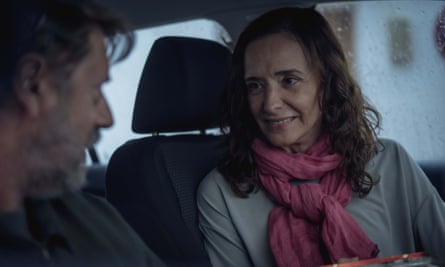
Small beer compared with the bliss of working again with Torrent. “It had to be her,” he says. “She was foundational to my first film. She gave it the truth of innocence. I had a debt to her that went beyond the professional. Time has passed, and you can see that. Time writes on all our faces. But here she is, repeating the same line, ‘Soy Ana.’” His eyes sparkle.
The experience was no less emotional for her. “The first day, I was on a cloud,” she says. “I looked at Victor and thought, ‘Fifty years later and here we are.’” How did he direct her? “He’s very precise but, at the same time, he asks that you abandon yourself to the mystery.” She regards Close Your Eyes as a profound summing-up. “All his experiences, everything he did and didn’t do, it’s all in this movie.” Would she work with him again? “I wish! If he calls me, I’ll go.”
She may be in luck. “Film is an adventure,” says Erice. “And I’m already thinking about the next one.”
Source: theguardian.com

